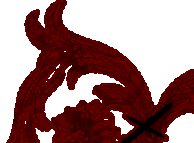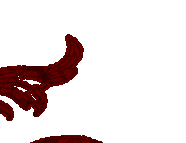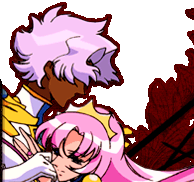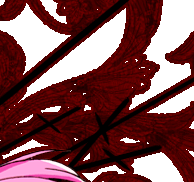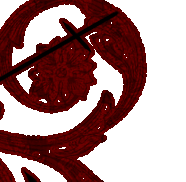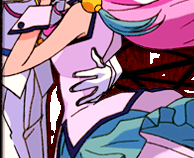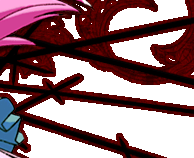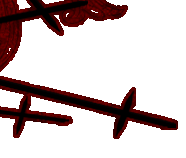

Who doesn’t
love that charming red-haired man? (Gio: Me, dammit!) Well, listen
to almost any Touga fan talk, and they’ll spout off about how
handsome he is, how charming, how princely, brave, and heroic. He
seems a paragon of virtue—just like all the other long-haired
bishounen out there. I won’t deny it. The person Touga appears
to be is very characteristic of the type, and very attractive to those
who dream that ‘someday my prince will come’.
Unfortunately,
it’s made very clear that Touga is not the prince
of anyone’s dreams. But all the manipulation and lies in the
world don’t seem to sway these fans that are so determined
to adore him. Like his flock of admirers from school, they persist
in believing that he is a prince, that he is heroic,
and that he truly does care about someone, anyone, other than himself.
Sorry, girls. Touga may be many things, but he sure ain’t
no prince.
Now, before
anyone starts wondering whether this is just another rant by just
another Touga-hater, I’ll make this very clear: he is my favorite
character. I, however, won’t look at him through those rose-colored
lenses most people seem to wear when they gaze lovingly into his
blue eyes. Truly, he’s infinitely more interesting once those
blinders are gone.
So why the horrible mutilation of character, forcing him into the
prince’s mold? Why the obstinate refusal to see any action
of his as wrong? For one answer to that, I’ll point you to
the sister to this essay—Akio and the Fangirls that Hate Him.
Many of the reasons Gio has stated apply here; to sum up, women
shy away from attraction to ‘bad’ men. Morality seems
to have much stronger roots in women, so much that our dark sides
are places that generally go unexplored, and women are afraid of
what others will say if they admit that a ‘bad’ man
is sexually attractive. While there are parts of this essay that
do not apply, the main thrust of it does, but with a twist: Touga’s
motivations are somewhat indistinct, making it easy to interpret
his actions in wildly different ways, as compared to Akio, who is
generally fairly easy to pin down as evil. And indeed, given the
circumstances of Touga’s last duel and the events before and
after, it is easy to forgive him his faults and choose to see only
the good in him. Touga, however, does not lend himself to sharp
definitions between good and evil—instead of black and white,
he is a character that is best viewed in colors and shades.
And really, red hair suits him far better than black would.
Fangirls of the sort that malign Touga by forcing him to be a prince
are generally the kind that adore the Hotohori type—handsome,
romantic, powerful, and confident. Without a doubt, all these qualities
are present in Touga. Arrogance may be passed off as simple confidence,
womanizing may be the sign of a heart that hasn’t found what
it’s searching for, deeds done out of selfishness go through
a mysterious alchemy that renders them pure. It’s easy to
fall into the trap of wishful thinking when the character is as
magnetic and charismatic as Touga. In fact, that’s what he
counts on. What lures his hordes of girlfriends isn’t simply
his good looks—the ambiguity of his actions toward them and
their own wishes to see him in the best possible light appeal to
all of his fans. They’d like to see him as princely, and he
unfailingly delivers by making sure his actions can be interpreted
that way.
It should be much easier for the audience to distinguish between
the façade and the reality, seeing as we do the more distasteful
side of his character, but apparently for most Touga fans, it’s
not. Dazzled by the romance of all the other long-haired beauties
and the wonderfully sexy voice of Takehito, fangirls flock instantly
to Touga, expecting him to be just the kind of man they like. And
when he steps out of character—that is to say, when he shows
his true nature—they fall back on those wonderful defense
mechanisms: rationalization or complete disregard.
‘Touga’s not really such a bad guy, if only Akio would
leave him alone.’
‘He really is Utena’s prince.’
And, my personal favorite…
He even saved Utena from getting hurt by Saionji! He’s
so brave!’
As I said before, it’s easy to fall into the trap of wishful
thinking, especially when he does his best to exploit it. Even Utena
fell for his princely act, for a little while. But honestly, it’s
not that easy. Episode nine is the first vivid sight of Touga’s
true colors, and the only scene I will dissect. There is more than
enough proof in that scene alone, and if you need more, what are
you doing reading this essay? Go watch the series again. Shoo.
Everything about that last scene is designed to show the audience
that Touga is most definitely not a prince. Though the phone call
never gives any names, it is made perfectly clear that Touga is,
in fact, speaking to Ends of the World. While this may not seem
damning at this point, for those of us who know the identity of
Ends of the World, it most definitely is. Touga seems to be working
with Akio of his own free will. And what has he accomplished? Why,
he’s gotten his ‘best friend’ expelled so that
he can look princely for Utena. Perhaps I may be leaping to conclusions
here, but this doesn’t seem like the way to treat a friend—Saionji
is obviously not from a wealthy family, and being expelled will
likely not endear him to his possibly abusive parents. Also, the
very fact that Touga has to notify Akio of that wonderful development
suggests that it was not something Akio had planned—that it
was something Touga did all on his own, because he wanted to. Because
he could.
Such a prince.
h, and we mustn’t forget the three girls in bed with him.
That should be a large hint that Touga’s affections are limited
to the physical, casting doubt on the nature of his feelings for
Utena. If Touga cannot feel simple friendship, and if he’s
so experienced (or might I suggest ‘jaded’) that a foursome
is ordinary enough to interrupt with a phone call, there certainly
isn’t any reason to believe that he is actually in love with
Utena.
His womanizing is continued throughout the series, until he seems
to realize that Utena does, perhaps, mean a little more to him than
just one of the fans he amuses himself with. That realization, spurred
on by Akio’s obvious triumph where he himself has failed,
causes him to rethink his methods and his position as the resident
playboy of the school. But why does this make it easier to forgive
his actions for the greater part of the series? Because he suddenly
realizes that Utena may indeed be important to him, does it mean
that he has suddenly become noble? Apparently, in the eyes of most
of his fangirls, it does. Because he recognizes that his actions
have been betraying his attempts to woo Utena, he apparently becomes
her prince.
Not so. While it is true that he has gained something in the way
of morals, he is no prince just because he figured out that sleeping
with other women isn’t the way to attract a girl like Utena.
So why does the rabid Touga fangirl refuse to see that?
Because
during the end of the series, Touga begins to develop the potential
to be a prince. And that is far more powerful a lure than all his
previous pretenses. While before he was simply playing the romancer,
he now shows some sort of real feeling for Utena. The rabid Touga
fangirl, armed with her wishful thinking, takes this as proof that
he really was a good guy all along because she likes to be vindicated,
ignoring the fact that this is perhaps the first concrete evidence
that points to Utena being anything more than a different face for
the foursome. But indeed, the glimpse of a soul finally beginning
the long struggle to better itself is a powerful and, dare I say,
noble image.
The movie, too, has done Touga’s character a disservice,
at least as far as understanding and interpretation come into play.
The movie’s Touga was the prince that the fangirls believe
him to be; brave, self-sacrificing, noble, and again, utterly delicious
to look at. Depending on the interpretation of the movie, he was
through no fault of his own the barrier that held Utena back from
reaching the real world. This version of Touga is held up as proof
that ‘he really really is a prince deep down inside’
when the series is discussed, completely disregarding the drastic
changes in character in both Anthy and Utena and how they might
affect the interpretation of the series version of both those characters.
For almost all intent and purposes, however, the series and movie
versions of the characters are completely different, despite a fondness
for women in general and a predilection for running their fingers
through their long red locks. It appears that the movie only affects
the series character interpretations when trying to prove that Touga
is a prince or that Akio is really a dork—a great disservice
to his character as well, I might add.
The reinforcement
in the fangirl’s brain, however, cannot be ignored. Since
Touga in the movie was a prince, it proves to them that Touga had
good intentions all along in the series, a highly improbable speculation
at best. But again, it seems to support their views, so in an astounding
display of selective perception, they disregard the fact that the
movie and the series are totally different. By now, you
must be asking how this comes about. How can any person manage to
blind herself enough to completely ignore all hints that Touga may
not be the prince he portrays?
Consider, now, the growth of the rabid Touga fangirl. Fresh from
Fushigi Yuugi and Weiß Kreuz, she decides to watch this new
series she’s been hearing about, directed by the same person
that directed Sailor Moon. Her expectations are high—this
should be a good one. And so, watching the first few episodes, her
eye is caught by the man with the red hair, his refinement, his
obvious charm, and his defense of Anthy from Saionji’s depredations.
Even the girls of the school adore him, fawn on him, and he returns
their interest with kind, but somewhat distant, smiles. He fits
the pattern of the long-haired bishounen to a tee; the mold of his
character is set. She decides that he must be the ‘hero’
of the story, aided by his obvious attraction to our heroine, Utena.
After a few more episodes, she is unsure—he seems like he
has ulterior motives, and maybe not very good ones. ‘This
cannot be,’ she says. ‘He is the love interest, the
one Utena deserves!’
Note the lack of logical thought here. Touga’s insidious
charm protects him from those who would doubt him by using his particular
combination of good looks, popularity, and some seemingly altruistic
action to trick girls into thinking that the façade he shows
to his female flock is his true self.
Having satisfied herself with this explanation, the rabid fangirl
watches on, to the end of his duels when, bothered once again by
Touga’s seeming defection into the realms of villainy, a revolutionary
thought strikes her. ‘What if he’s not exactly good,
but he’s trying to be?’ She eagerly watches the next
episode so that she can test her theory.
Lo and behold! Touga has locked himself in his room, no longer
willing to face the world. ‘That must be it!’ she cries
excitedly. ‘He didn’t understand that what he was doing
was wrong—now that he knows, he’s so full of regret
that he can’t face the rest of them!’ Full of self-congratulation,
the rabid Touga fan waits for the triumphant return of her object
of adoration. Through the Black Rose arc, she watches, catching
mere glimpses of her beloved in Keiko’s duel episode, and
even those appear to support her theory. And then, once Mikage has
finished his duel, he reappears—except this time, he is accompanied
by the handsome and mysterious Ohtori Akio.
‘Oh
no!’ the Touga fan cries. ‘How can Touga associate with
this evil, evil man?’ Then, another revolutionary thought
strikes her: Akio is using Touga. ‘That must be it!
Akio has tricked him!’
Note the
way the blame is placed neatly on Akio. He is the villain,
tricking and using poor Touga, who would never do the things he
does without some sort of outside influence. Of course not.
The cruelty in Touga’s manipulations increases, but, content
with her assessment of the situation, the Touga fan’s hatred
of Akio grows and her pity for poor Touga increases with every episode
she watches. Until suddenly, Touga seems to break free of Akio’s
sway. He starts to become more princely—he even duels to prevent
Utena from the danger ahead! And he begins to question his lifestyle
as a playboy, wondering whether it has truly served him! Flushed
with vindication, the Touga fan watches on until the end, and erases
all trace of doubt from her mind. She knew he was a prince all along,
and now Touga has proven it.
During her viewing of the series, the Touga fan has also been speaking
with other fans of Revolutionary Girl Utena,. Now, in the first glow of her triumph, she
begins to search out webpages devoted to her favorite bishounen,
or perhaps begins to make one. Fans like myself avoid these webpages,
because the mutilation of his character is nauseating to watch.
But this Touga fangirl finds others, likeminded, and they begin
to trade ideas back and forth. In the most militant of these groups,
any suggestion that Touga may have done wrong is met with outrage,
or worse, ridicule; the Touga fangirl wants the approval of her
friends, and so she conforms to the ideas that are accepted by the
group. The movie, watched at any time throughout, only reinforces
the ideas she has in place. And finally, once her beliefs about
Touga are so deep-rooted that she cannot stand to have his name
tarnished by any hint of unprincely action in her presence, she
begins to quote the scene where he first realizes he’s become
a slut to anyone who dares cast doubt on her beloved.
“Kiryuu
Touga, the playboy Seitokaicho, is it? ‘Playboy’ sounds
old-fashioned…”
Frightening, isn’t it?
In any case,
you can see the line of reasoning. With a character so accustomed
to swaying the thoughts and emotions of the female half of the populace
of Ohtori, how can we blame these poor creatures for being taken
in by his charms? His character, however, is clear to anyone willing
to see it. Cold, predatory, sexually driven, and arrogant to a fault,
Touga is hardly the model of a prince. Those that believe him to
be so are tricked by a combination of the bishounen stereotype,
their own unwillingness to admit that they find a morally bankrupt
character attractive, the potential to be a prince that he gains
near the end of the series, and his own machinations throughout.
The rabid Touga fangirls place more emphasis than is warranted on
the few actions that could be considered good and then either disregard
the blatantly selfish actions or twist them into highly implausible
princely parodies of what he truly intended. It's ironic that, were
these girls ever to meet him, they would be nothing more to him
than the swarms that surround him every day at Ohtori.
All right, ladies—who wants to be in the foursome tonight?
 |

